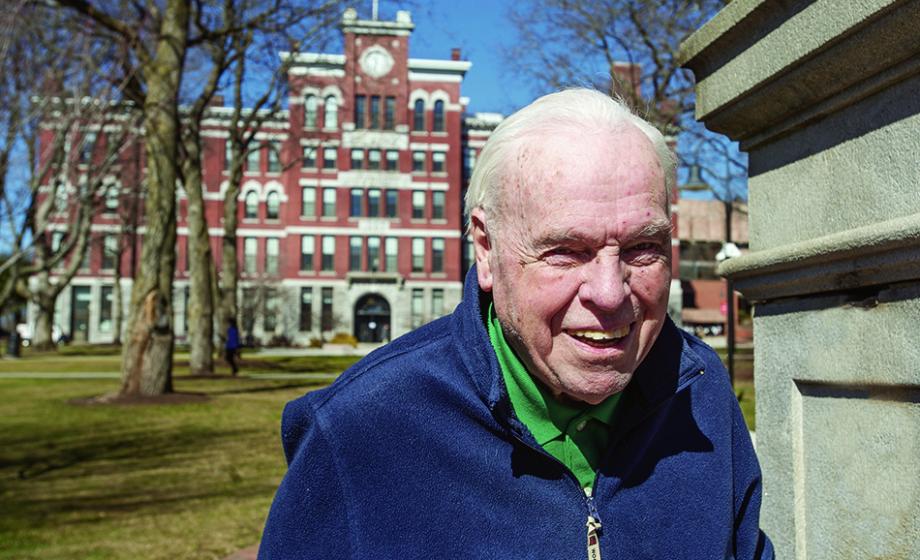#ClarkTogether
At 100, Al Southwick ’41, M.A. ’49, is still writing

When Albert B. Southwick ’41, M.A. ’49, began covering the news as a college student, the attack on Pearl Harbor was still several years away, the average price of a new car was $860, and Action Comics had just released the first Superman comic.
Roughly 80 years later, so much has changed. But one thing the Worcester community can still count on? Southwick’s words — once a week in the Worcester Telegram & Gazette.
Southwick, who turned 100 on June 22, still pens a weekly column for the newspaper he retired from in 1985. He got his start in journalism at Clark University in the late 1930s, joining The Scarlet his sophomore year and rising to the position of managing editor. Writing remains a labor of love, he says, but as a historian, Southwick also knows that the past plays a key role in informing current events.
“The more people know about the past, the better equipped they are for the present,” he says.
Southwick grew up on a farm in neighboring Leicester and studied English and history at Clark — two interests he discovered during his undergraduate career. He played on the tennis team all four years, serving as captain as a senior. At the time, first-year students were issued red beanies and told to wear them at all times while on campus. Clark was an all-male institution (save for the occasional woman from one of the graduate schools), tuition was $100 a semester, and five buildings comprised campus.
“It was the only place my parents could afford to send me,” Southwick says.
Southwick’s college years were tinged with an ominous shadow as the war in Europe began, yet he and his peers were hopeful that the United States wouldn’t get involved in the escalating conflict. Six months after graduation, the Japanese attacked Pearl Harbor and Southwick enlisted in the Navy, serving as a bomber pilot during World War II.
“I think that every one of us went into the military,” he recalls.
After four years in the armed forces, Southwick went on to earn his master’s degree in American history from Clark and began working as a historian with the U.S. Seventh Army in Germany. It wasn’t long before he transitioned back into journalism, landing a job as a reporter at The Providence Journal and then as an editorial writer at The Evening Gazette in Worcester in 1952.
“I was interested in newspapers all the way back into the Navy,” he says.
Southwick retired as editorial page editor of The Evening Gazette in 1985 — a year before the newspaper merged with the Worcester Telegram to form the present-day Worcester Telegram & Gazette.
“I started as an editorial writer and I ended as an editorial writer,” he says.
But Southwick’s work never stopped. Thirty-five years later, he continues to write a weekly column for the newspaper, bringing a historical perspective to current issues including immigration, climate change, and the COVID-19 pandemic. Southwick says he doesn’t have any particular process for writing his column, but gathers ideas from watching the news and doing a lot of reading.
“I enjoy writing,” he says. “That’s why I do it.”
Southwick has also published numerous books with the help of his daughter, Martha, including collections of letters to and from his parents during World War II, stories of growing up on Maple Hill Farm in Leicester, and Worcester County history. Southwick, who still lives in Leicester, says he’s watched the area change dramatically over the years. “It has been quite considerable,” he says, adding that he’s optimistic about Worcester’s future. “Growing up, it was the most different kind of city. It was a mill town.”
Despite all he’s experienced during his lifetime, Southwick says he’s never seen anything affect his community — or the world — quite like the COVID-19 pandemic. The tornado of 1953 that tore through Worcester was devastating, but affected a small portion of the city. The hurricane of 1938 was more severe in terms of its reach, but Southwick describes the novel coronavirus as “something different.”
The outbreak has prevented Southwick from visiting his wife, Betty, at the Jewish Healthcare Center in Worcester where she now resides. While he would normally see her every other day, Southwick says their conversations have been limited to phone or Skype calls for the past several months.
“It’s not easy being unable to see the person who’s so important to you,” he admits.
Southwick’s first wife, Shirley, died in 1998. They had four children, six grandchildren, and four great-grandchildren.
As for reaching the centenarian milestone? Southwick says it’s been quite unremarkable.
“It’s not much different from 99,” he says.


